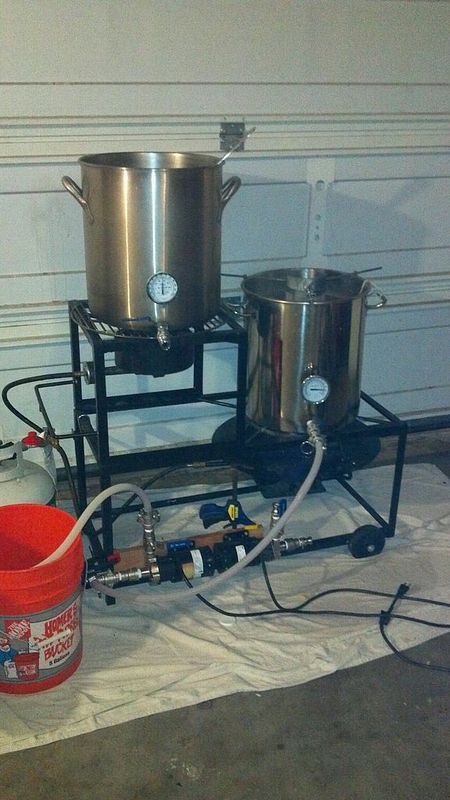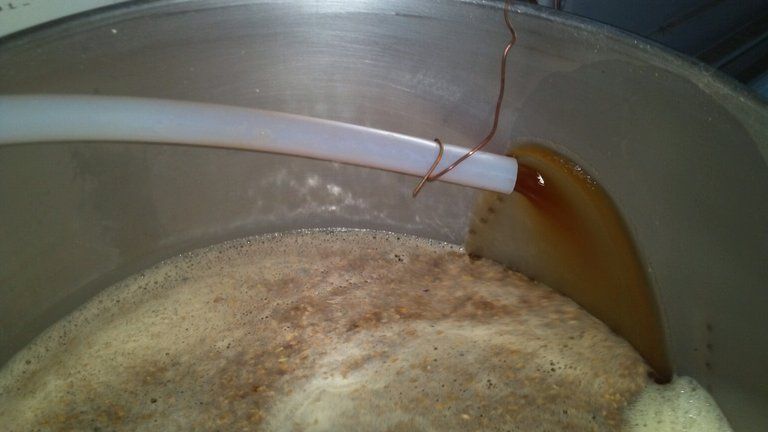jbaysurfer, thanks for the reply, it really helped and tells me I am on the right track. I do have a couple of questions since it sounds like we are brewing in a similar fashion.
How long do you typically hold your grain in the mash tun after mash in at 154 degrees?
Generally speaking, if the grainbill is over 15lbs for a 5-6G batch, I'll do a 90 minute mash. If it's less than that, I'll do a 60min. mash. By the time I'm done sparging it takes 90min or so.
Do you recirc water in your mash tun for first runnings prior to draining?
Absolutely. I generally recirc from the outset, while stirring etc and then once I'm satisfied with the mash temp, I'll shut the pump and burner (if it's on) off and cover it up and it'll hold temp pretty well until about 10 minutes before draining the Tun....(continued below)
At what point do you typically mash out first runnings and then drain?
.....then I'll fire the pump and burner, and NOT stir while I heat the wort to 168F (takes about 10minutes) and then turn off the burner and drain the Tun.
What ratio of water to grain are you typically using?
I get better efficiency with a thinner grist, 1.3-1.35Q/lb. I have a 10G Mash Tun so that affords me the extra space for a thinner grist in doing my 5-6G batches. If the calculations call for more then 5G of sparge water (usually the case), I'll split the batch sparge into two steps. Takes extra time, but I find it increases extraction.
Have you ever thought about a rims tube rather than direct fire.
I've thought very seriously about it. Then I got a 25' copper coil and soldered some hose barbs onto it and started using it as a HERMS coil in my HLT, but I didn't find it to be any faster in adjusting mash temps then just firing the burner and running the recirc pump. Essentially a direct fire with a pump IS a RIMS, because you're recirculating the wort across a heat source, it's just not an electric element in this case. I keep my herms coil for when I want to get fancy and do step mashes, but I bet I could do them just as well without it. I do use it in the HLT with ice water when I'm cooling a lager to pitch temps though.
I'll post some pics of my system and would like to see yours.
Took some pics last night while brewing a Brown Ale:
This is just after the last sparge, while the BK is heating up to a boil. Mash tun is on the upper tier, BK on the lower. When I'm still mashing, the HLT is on the lower, and the BK sits on a step thing (I think that's the technical term) until I'm done with the HLT, then I swap them. Sometimes if time is of the essence, or I'm trying to do a double batch, I'll get out my 3rd burner (bayou SQ14 burner) and put the BK on that one. You'll notice I have two pumps, but I still batch sparge. My efficiency is great, I'm comfortable with the process, and I've been getting great results.

My wort return is nothing more then a silicone hose that I aim toward the wall of the MT to diffuse the flow. Copper wire holds the tube in place. I've found with thinner grists it's harder to get the tube to "float" on top of the grainbed and not tunnel. Low tech but effective. I came up with this after realizing that all the wort return solutions out there presented both cost and their own sets of issues to deal with. This is also the technique I use for whirlpooling at the end of the boil, which, in conjunction with my 50' IC, cools the wort quite quickly and allows me to really milk those flame out additions for aroma.










